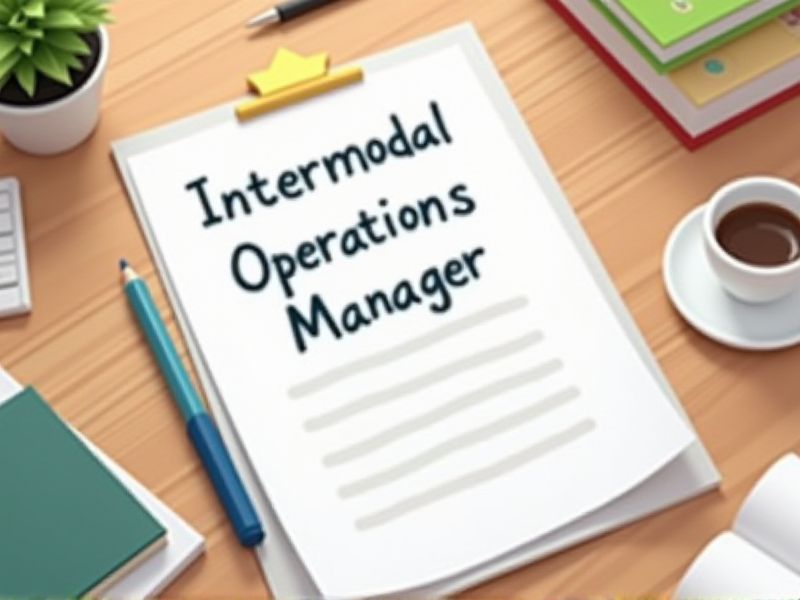
An Intermodal Operations Manager oversees complex logistics, linking various modes of transportation to ensure smooth supply chain processes. Certifications provide essential knowledge in areas such as transportation laws, risk management, and logistics technology, which drive efficiency and compliance. Certified managers often demonstrate a higher level of expertise, leading to greater trust from employers and stakeholders. Important certifications you may need for an Intermodal Operations Manager include the Certified Supply Chain Professional (CSCP) and Certified in Transportation and Logistics (CTL).
APICS Certified Supply Chain Professional (CSCP)
An Intermodal Operations Manager oversees complex logistics involving different transportation modes, and APICS CSCP certification provides a comprehensive understanding of integrated supply chain processes. The certification ensures managers are well-versed in global logistics and can effectively manage supplier-customer relationships, crucial for seamless intermodal operations. With the unpredictable nature of supply chain disruptions, the CSCP certification equips managers with strategic insights to mitigate risks efficiently. Enhanced knowledge from the certification aids in optimizing operational efficiency, leading to cost savings and improved service delivery in intermodal systems.
APICS Certified in Logistics, Transportation and Distribution (CLTD)
An Intermodal Operations Manager benefits from the APICS CLTD certification as it provides a comprehensive understanding of logistics, transportation, and distribution, which are crucial for overseeing complex supply chains. The certification enhances strategic planning skills necessary for optimizing multimodal transportation and aligning operations with industry best practices. Knowledge gained from the CLTD program helps managers implement more efficient, cost-effective solutions in freight management and intermodal coordination. Employers often seek certified professionals to ensure advanced competency in handling the challenges of global logistics networks.
Lean Six Sigma Black Belt Certification
Lean Six Sigma Black Belt Certification equips an Intermodal Operations Manager with advanced problem-solving skills to enhance efficiency in transportation logistics. Enhanced process optimization through this certification leads to reduced transit times and operational costs. A deep understanding of statistical analysis and quality control ensures consistent service delivery and customer satisfaction. Formal training fosters leadership qualities necessary for effectively managing teams and driving continuous improvement initiatives in intermodal operations.
Project Management Professional (PMP)
The complexity of intermodal operations requires meticulous coordination across various transport modes, and the PMP certification provides structured methodologies for effective project oversight. A PMP-certified Intermodal Operations Manager brings a systematic approach to managing resources, timelines, and budgets, reducing inefficiencies and delays. Data shows that PMP-certified professionals tend to deliver projects that meet their objectives more reliably, improving overall operational performance in intermodal settings. Intermodal operations often face unpredictable challenges, and PMP certification equips managers with problem-solving techniques that enhance resilience and adaptability.
Certified Professional in Supply Management (CPSM)
Certifications like CPSM equip Intermodal Operations Managers with a comprehensive understanding of supply chain fundamentals, enhancing their ability to streamline operations. The credential demonstrates a commitment to continuous learning, which is crucial in adapting to the evolving complexities of intermodal transportation. Possessing CPSM certification often leads to improved negotiation skills, essential in managing contracts and collaborations with various stakeholders. The knowledge gained from CPSM can result in cost reductions and increased efficiency, directly benefiting the bottom line of intermodal operations.
Customs Broker License
A Customs Broker License is essential for an Intermodal Operations Manager because it ensures compliance with intricate import and export regulations, reducing the risk of legal penalties. Holding a license enables efficient management of documentation and tariffs during transit, thus preventing costly delays. The licensed expertise helps in navigating customs procedures that are crucial for the seamless movement of goods across borders. It enhances credibility and trust with clients and partners, fostering stronger business relationships and operational reliability.
Occupational Safety and Health Administration (OSHA) Certification
OSHA Certification is needed for an Intermodal Operations Manager to ensure compliance with safety regulations, reducing the risk of workplace accidents. Certified managers are equipped to create safer work environments, which can lead to increased operational efficiency. Proper safety practices decrease the likelihood of costly disruptions caused by incidents or regulatory fines. With OSHA certification, managers are better prepared to train and guide teams in adhering to safety standards, thereby enhancing workforce safety culture.
Transportation Worker Identification Credential (TWIC)
Transportation Worker Identification Credential (TWIC) is necessary for Intermodal Operations Managers because it provides access to secure maritime facilities and vessels, enhancing security measures in the transport sector. It enables managers to conduct inspections and oversight within restricted port areas, ensuring adherence to safety protocols. With a TWIC, managers can facilitate smoother coordination between different modes of transportation, minimizing delays in cargo handling and transfer. Having this credential complies with federal regulations, reducing the risk of penalties for the organization.
FIATA Diploma in Freight Forwarding and Logistics
The FIATA Diploma in Freight Forwarding and Logistics provides in-depth knowledge of global logistics chains, which is essential for coordinating complex intermodal operations. Properly trained intermodal operations managers can optimize routes and modes of transport, reducing costs and increasing efficiency for the company. This diploma equips professionals with the skills to manage regulatory compliance and risk management across different transportation modes. Having a recognized certification increases credibility and trust with clients and partners in the freight forwarding industry.
Certified Logistics Technician (CLT)
Intermodal operations require seamless coordination across different transportation modes, making detailed logistics expertise essential. A Certified Logistics Technician (CLT) provides the necessary skills to streamline these complex processes efficiently. With a CLT, an Intermodal Operations Manager ensures compliance with industry standards and optimizes cargo handling. Enhanced problem-solving and analytical capabilities gained from CLT training significantly improve operational efficiency and cost management.
Summary
When you, as an Intermodal Operations Manager, obtain relevant certifications, your skill set and industry knowledge significantly expand. This development enhances your problem-solving capabilities and decision-making processes within intermodal logistics. Employers likely view your certified status as a reliable indicator of expertise, often leading to better job opportunities or promotions. The industry benefits from your advanced understanding through improved efficiency and operational performance.
